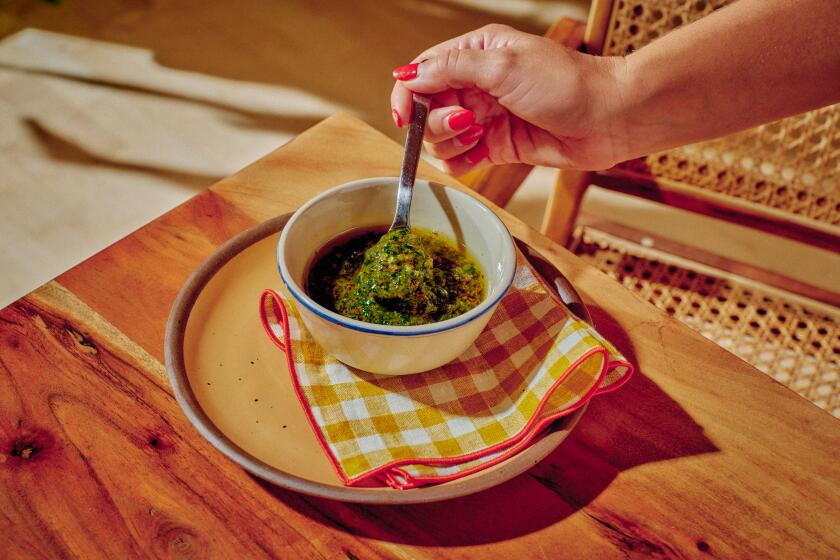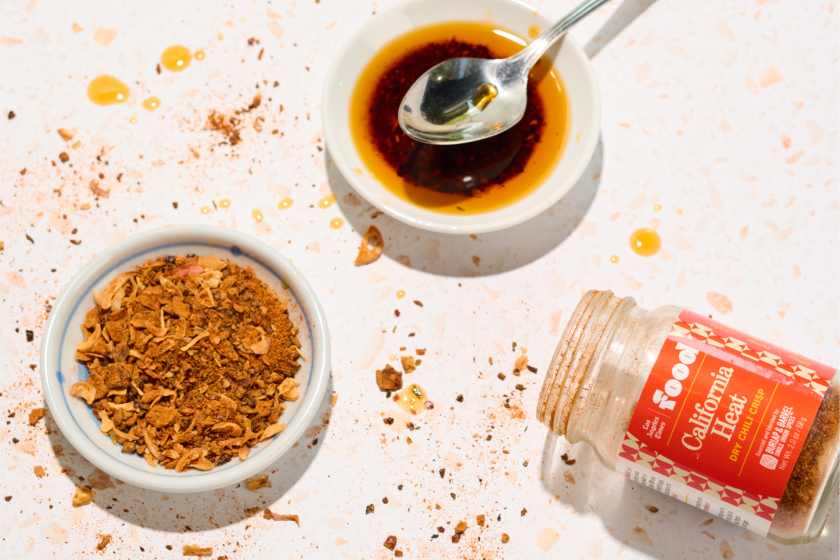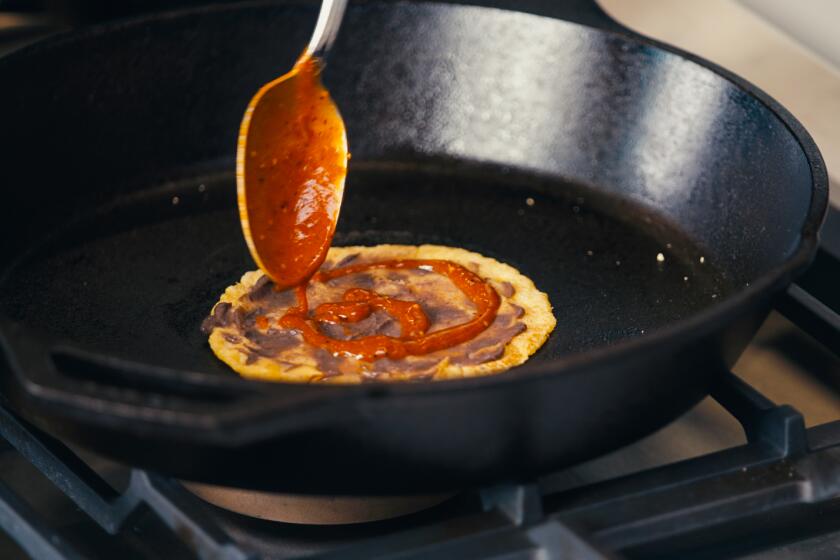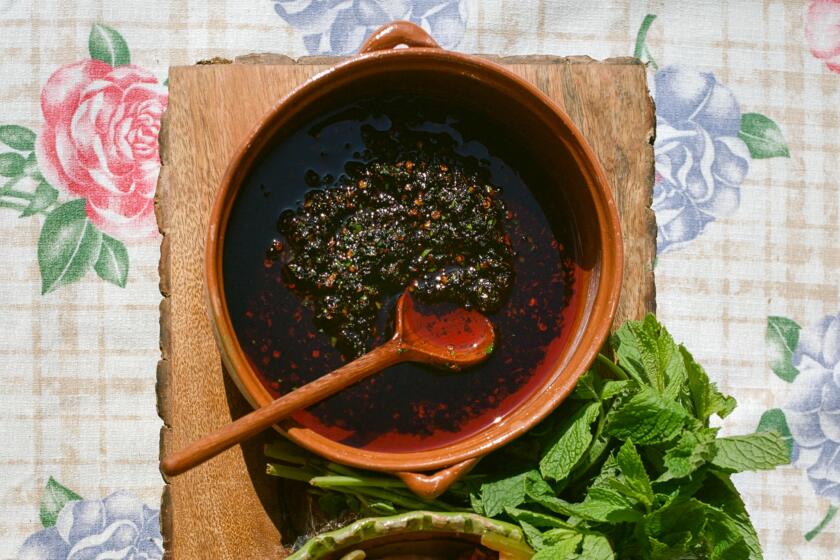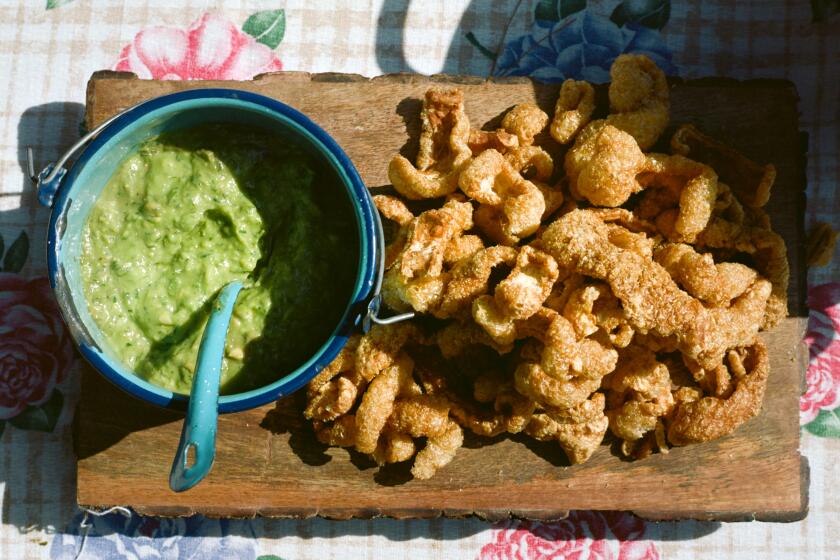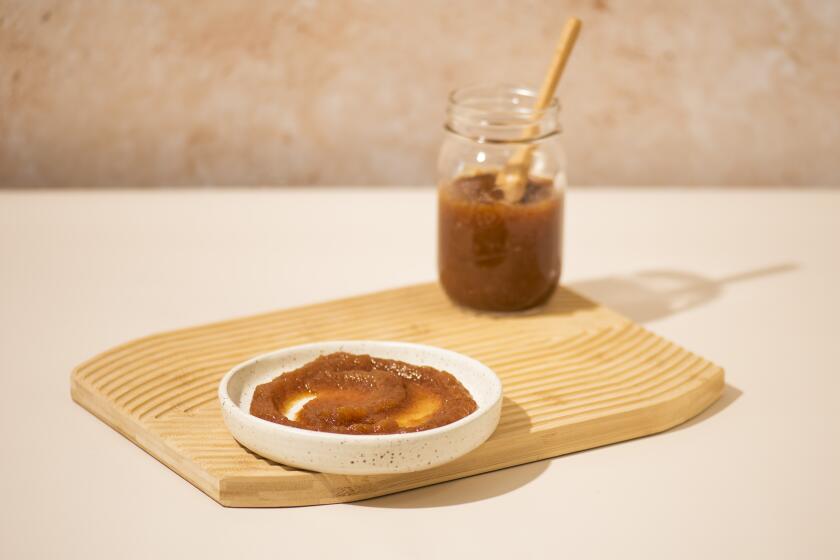Smoked paprika romesco sauce
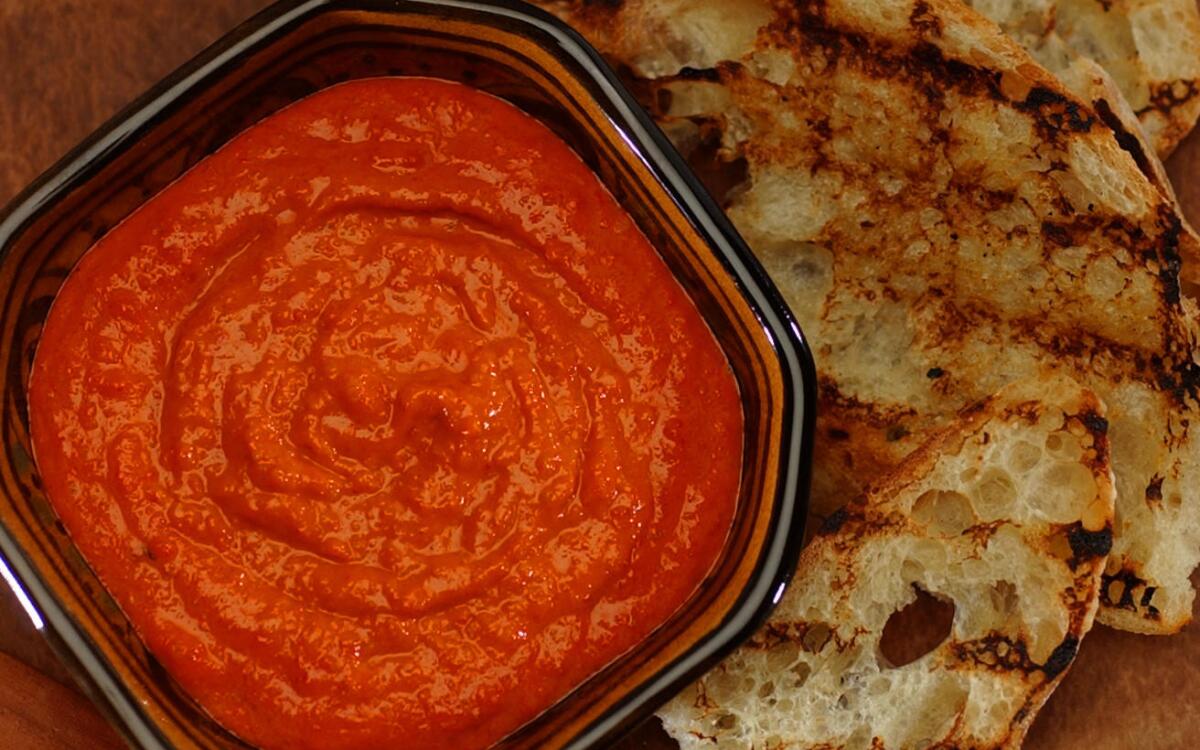
- Share via
Just about every night this time of year, the most seductive smell breezes into my apartment like a taunt. Somewhere some neighbor has fired up a hardwood grill for dinner while I’m trapped with neither backyard nor Weber.
It always makes me think the slogan for summer food should be “Things go better with smoke.” And then it makes me think of ways to get the smoke without the fire.
As it happens, these days there are so many superb smoked foods on the market that I don’t need a grill to evoke the flavor and the fragrance my neighbors sweat over. An ever-growing array of artfully smoked choices, from applewood-infused bacon to smoked black pepper, can impart the same irresistible potency to the best fresh ingredients of the best season for cooking. Smoke almost qualifies as one of the four elements.
A little smoked duck or a few smoked shrimp can take a potato salad to another level. Smoked mozzarella imparts an almost meaty aspect to eggplant gratins. And a heaping tablespoon of smoked paprika pureed with smoky piquillo peppers will produce the most amazing all-purpose dip/spread/dressing since the first avocado was mashed into guacamole.
The haunting flavor of smoke always adds either an undertone or a high note, or induces general harmony between the super fresh and the subtly oaked.
It’s one of the little ironies of the food world that a technique devised as a way to preserve food, especially for the winter, is so useful with summer ephemera. Smoked seafood is the most outstanding partner that corn pancakes could ever have, as a first course or hors d’oeuvres. Smoked tuna reinterprets a salade nicoise with the double-teamed flavors of fish and wood smoke. And smoked black pepper turns seared tuna or swordfish into steak from a dimension far, far away from one-note beef.
Every year it seems more smoked foods turn up to compete with fresh ones and wind up complementing them. Some are new, many just improved. Smoked duck makes smoked turkey look passe. Smoked mussels can still be found in a can but are more likely to be sold in the same case as caviar. The best smoked salmon is made from the wild fish out of the Pacific Northwest; its lean flesh takes on oaky intensity with no oiliness. (Echo Falls brand from Seattle is the best I have tasted since I first learned the difference between Nova and lox.) Any good cheese shop will stock smoked cheeses, from Holland (Gouda), England (Cheddar), Spain (Idiazabal) and Germany (Bruder Basel), to name a few.
Aroma in a jar
My latest discovery is smoked black pepper, which I spotted in a restaurant trade magazine and immediately ordered online. Initially I suspected it would be something as synthetic-seeming as Liquid Smoke (which is another story). But upon opening the one-pound jar, my only question was: Where has this been all my summers? The aroma seems to have drifted straight in from a barbecue pit in Texas, and in fact the producer, Alex Gardega of Cattleman’s Smoked Spices, says his intention was to evoke his former home state, “where they smoke everything.”
Smoked pepper goes everywhere the straight stuff will, but its smooth aggressiveness doubles the smoky flavor in some dishes. My usual smoked trout spread made with cream cheese tasted a lot livelier with a hefty dash of Cattleman’s. And when I substituted the spice for regular crushed Tellicherry peppercorns in a panko crust for sauteed fillets of fish and for tuna steaks, they could have come off a campfire. (It’s sold only in bulk from www.chefswarehouse.com; one pound is $8.64 plus shipping.)
Cattleman’s also smokes kosher salt, which is a nice idea that dissipates as it dissolves, and Hungarian paprika, which I was reluctant to invest in because I still have plenty from Spain. I found mine in the Canary Islands a while back, but the same brand, La Chinata, is now almost as commonplace as celery seeds in American food shops. And it’s worth adding to the most overloaded spice rack.
Unlike regular paprika, whose greatest value seems to be the color it adds to deviled eggs, the smoked kind has a dusky, potent flavor that reminds you with a punch that paprika is a pepper. In a variation on the Spanish sauce romesco, a sauce that has been endlessly twisted and tweaked in countless cookbooks and all over the cyber kitchen, the paprika combines with piquillos and sweet, toasted Marcona almonds to make a sensation that could put salsa out of business.
One indicator of how suited smoked foods are to summer is their prevalence in places where they know what hot is. When I was in New Orleans a few years back, it seemed half the chefs in town were smoking mushrooms to top pizzas or add to pasta or toss with salads.
In the Florida Keys, where apparently everyone fishes and has a backyard smoker, every bar and cafe seems to serve what they all call “fish dip,” a magic mixture of smoked tuna or marlin whipped with mayonnaise, relish, onion and hot pepper. Spread on Club crackers, it tastes like August even in February.
And then there is the whole tradition in Mexico of giving a fresh chile a new identity through smoking: jalapenos are made over into chipotles, poblanos into anchos. The payoff is easy-to-use, easily amplified smokiness -- there is no better sauce for crab cakes (or Dungeness crab or grilled fish) than mayonnaise spiked with minced chipotles, garlic and cilantro.
But a hot climate is not the only smoky inspiration. On a trip to Estonia recently, I had a sensational open-face sandwich in a roadside bar that combined sauteed wild mushrooms and smoky salmon on brown bread. Even stranger, in Belfast I once discovered the only pasta salad worth making over and over: warm penne tossed with top-grade smoked salmon, sour cream, olive oil, julienned butter lettuce and plenty of chives and dill.
Some smoked foods admittedly could be made from scratch, including salmon, trout and tuna. But this is the season for easy eating, and there’s no stigma to slitting open a package of ready-to-slice magret duck breast rather than going through the brining and smoking that D’Artagnan did. And other smoked foods are best left to the experts, particularly pepper and paprika. To infuse those, Gardega smokes them in a coffee roaster over mixed hardwood during the course of a day or so.
Many smoked products are also so well done commercially there’s no sense in trying to do them at home. Ducktrap River Fish Farm in Maine distributes extraordinary smoked shrimp, scallops and mussels that make beautifully flavored additions to any hot weather classic. (Specialty markets carry them, but they are also available online at www.ducktrap.com.)
With any of these, you can only think Tennessee Williams had the right idea but the wrong medium. The drama of summer and smoke should be in the kitchen.
Combine the almonds, piquillos, olive oil, smoked paprika and cayenne in a blender. Process until smooth.
Transfer to a bowl; stir in the garlic and vinegar and salt to taste. Serve as a spread on bread, a sauce for grilled fish or meat or as a dip for roasted potatoes.
Get our Cooking newsletter.
Your roundup of inspiring recipes and kitchen tricks.
You may occasionally receive promotional content from the Los Angeles Times.










